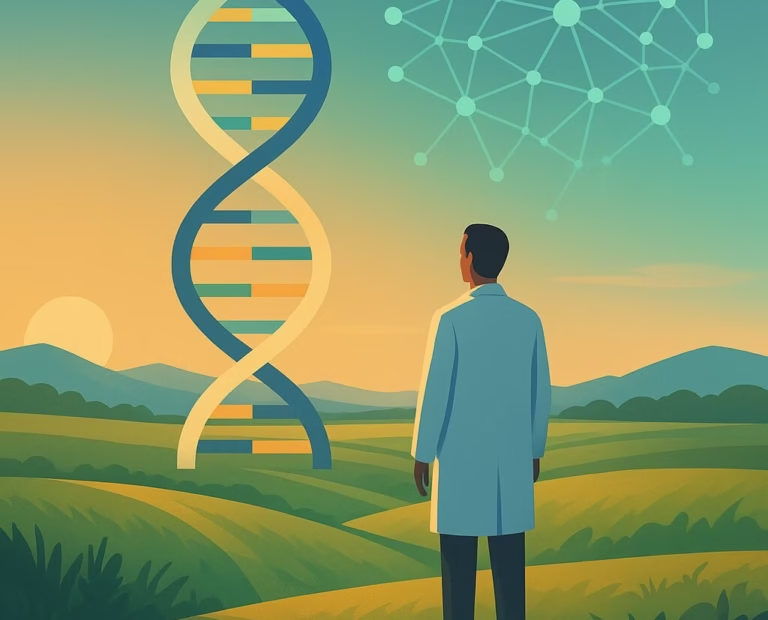When you talk to Dr. Gualberto Ruaño, you don’t just hear about science — you hear about purpose. A physician, geneticist, and entrepreneur, Dr. Ruaño has spent his career proving that medicine can be more personal, more precise, and more humane. Long before “personalized medicine” became a buzzword, he was already building the technologies to make it real — founding companies like Genaissance Pharmaceuticals and Genomas, and developing groundbreaking genetic tools that helped transform HIV treatment and clinical pharmacogenomics.
What drives him is simple: empowering patients with knowledge.
“The more information patients have at their hands to make decisions, the better for them,” he says.
In this conversation, Dr. Ruaño reflects on his journey from Yale researcher to biotech pioneer, the lessons he’s learned building two trailblazing genomics companies, and his vision for the next era of pharmacogenomics.
APGxA: You have often been described as a pioneer in pharmacogenomics. How did your journey in this field begin?
Dr. Ruaño: My journey began at Johns Hopkins University, where I completed my bachelor’s degree before pursuing my MD and PhD at Yale. A turning point came during my PhD, where I delved into the concepts of genome diversity and evolution. I had the privilege of working under two remarkable mentors, Dr. Kenneth K. Kidd and Dr. Frank Ruddle. Dr. Kidd, a population geneticist, opened my eyes to the historical significance of genetic variation, while Dr. Ruddle was a pioneer in genomics. Under their guidance, I learned how genetic diversity has a history that can be studied and quantified through molecular techniques.
This foundational knowledge ignited my passion for personalized medicine. I realized that as a medical student in the MD/PhD program, I could translate my research interests into practical clinical applications. This led me to explore how genomics could inform drug therapy and improve patient outcomes.
APGxA: How did Genaissance Pharmaceuticals begin, and what was your vision when you founded it?
Dr. Ruaño: The idea for Genaissance came from a sense that medicine was ready for a renaissance — a rebirth grounded in genetics. Our logo was Leonardo da Vinci’s Vitruvian Man, symbolizing the connection between evolution and the human body.
At that time, I wanted to take the concepts we were developing in molecular genetics and evolution and apply them to real clinical challenges within a biotech setting. Genaissance became the first company to go to market with the idea of developing truly personalized medicines — therapies informed by each patient’s genetic makeup.
APGxA: After Genaissance, you founded Genomas, which focused more directly on the clinical side. What gap were you trying to fill?
Dr. Ruaño: Genaissance was about discovery — finding new associations between genes and drug response. Genomas was about delivery — bringing those discoveries to patients. I founded Genomas with the goal of integrating pharmacogenomic testing into hospital systems, starting with metabolic and cardiovascular diseases.
One of our significant achievements was working closely with patients in mental health and cardiovascular care. We provided insights into how genetic factors influence medication efficacy and safety. For instance, we often encountered patients struggling with psychiatric medications. By analyzing their genetic profiles, we could offer tailored recommendations that improved their treatment plans.
APGxA: What were some of the challenges Genomas faced in its operations?
Dr. Ruaño: Genomas enjoyed a fruitful 15 years of operation, but we faced significant barriers, particularly regarding insurance reimbursement. Many insurance providers were reluctant to cover genetic testing, leading us to shift towards a self-pay model. This shift limited access for many patients who could benefit from pharmacogenomic insights. Despite these challenges, we published extensively, contributing valuable research to the field, including findings on the effectiveness of genetic testing in psychiatric treatment.
APGxA: You’ve highlighted the importance of targeted testing. Would you recommend pharmacogenomic testing for all patients, particularly before they start on new medications?
Dr. Ruaño: I advocate for pharmacogenomic testing for specific populations, particularly vulnerable groups such as seniors on multiple medications and children undergoing psychiatric treatment. It’s crucial to identify individuals who have previously experienced adverse reactions to medications. The goal is to ensure that we have documented medical needs before conducting genetic testing, which can lead to better-informed treatment decisions.
APGxA: What do you see as the major obstacles to implementing a single pharmacogenomic test that could suffice for all treatments over a patient’s lifetime?
Dr. Ruaño: There are two primary challenges. First, the technology in genomics is rapidly evolving. What we understand today may change as new discoveries are made. As knowledge in genomics expands, so too must our testing methods. Second, the pharmaceutical landscape is continuously advancing. New drugs and interactions emerge regularly, meaning we cannot rely on a one-time test to provide comprehensive insights throughout a patient’s life.
APGxA: Can you elaborate on your significant work concerning warfarin and its implications for patient care?
Dr. Ruaño: Warfarin is an essential medication with a narrow therapeutic index, meaning that the difference between an effective dose and a harmful dose is quite small. Due to this risk, it is crucial to tailor warfarin’s dosage based on genetic factors that influence how individuals metabolize the drug. My research emphasized that by understanding these genetic variations, we could greatly enhance patient safety and treatment efficacy.
APGxA: You’ve mentioned that more than two decades ago, you introduced what you called the “portfolio model” for personalized medicine — an idea that now seems to be thriving in oncology. Can you explain what that concept was and how it’s being realized today?
Dr.Ruaño: The portfolio model was my way of rethinking how medicine could stay personalized without shrinking the market. The idea wasn’t about making a different pill for every person — it was about creating a portfolio of drugs. One drug works best for one group, another for a different group, and together they cover the full patient population.
At the time, that concept wasn’t well understood. The industry was more comfortable with one drug for everyone, not several tailored options. But if you look at oncology today, that portfolio approach is exactly what’s happening.
We now have targeted therapies designed for specific tumor mutations. Each mutation has its corresponding compound — drug A for mutation A, drug B for mutation B, and so on. The science, the diagnostics, and even the business model have aligned. Pharmaceutical companies include the mutation on the drug label, insurers cover the treatments because they’re lifesaving, and companies often pay for the genetic testing because it’s essential to prescribe the therapy.
It’s rewarding to see that what was once an abstract idea — precision portfolios for defined patient subsets — is now a practical framework driving modern oncology.
APGxA: What improvements do you believe are essential for making pharmacogenomics more accessible and practical in clinical settings?
Dr. Ruaño: We need to prioritize decision support systems that help providers interpret genomic data effectively. This means integrating these systems into routine medical practice. We have to ensure that healthcare providers have the tools to utilize pharmacogenomic data in their prescribing practices, which requires training and resources.
Furthermore, raising awareness among healthcare professionals about the advantages of pharmacogenomics is vital. Many clinicians are still skeptical about its clinical impact. As I often say, “Until you dive in, there’s skepticism. Once you learn what’s possible, you see the lifelong impact pharmacogenomics can have.”
APGxA: Do you see a role for artificial intelligence in enhancing the field of pharmacogenomics?
Dr. Ruaño: Absolutely. AI has the potential to analyze vast amounts of genomic data and integrate it with pharmacological information, ultimately improving patient care. However, it’s crucial to approach the implementation of AI realistically. The models used must be trained on quality data to be effective. There’s incredible promise here, but we have to ensure that we’re using the best practices in AI development and application.
APGxA: Looking back, what are you most proud of in your career so far?
Dr. Ruaño: I’m proud that we showed pharmacogenomics could be real. When we started, it was an idea that lived mostly in scientific papers. Today, we see it guiding drug prescriptions for mental health, pain, cardiovascular disease, and many other conditions.
I’m also proud of the teams I’ve worked with — brilliant scientists, clinicians, and entrepreneurs who took risks and believed in the mission. Science is a collective journey. No one builds something lasting alone.
Dr. Ruaño’s insights reflect a deep commitment to advancing the field of pharmacogenomics and ensuring that patients are equipped with the knowledge they need to make informed healthcare decisions. His emphasis on integrating genomics into clinical practice highlights the transformative potential of personalized medicine in improving patient outcomes.





